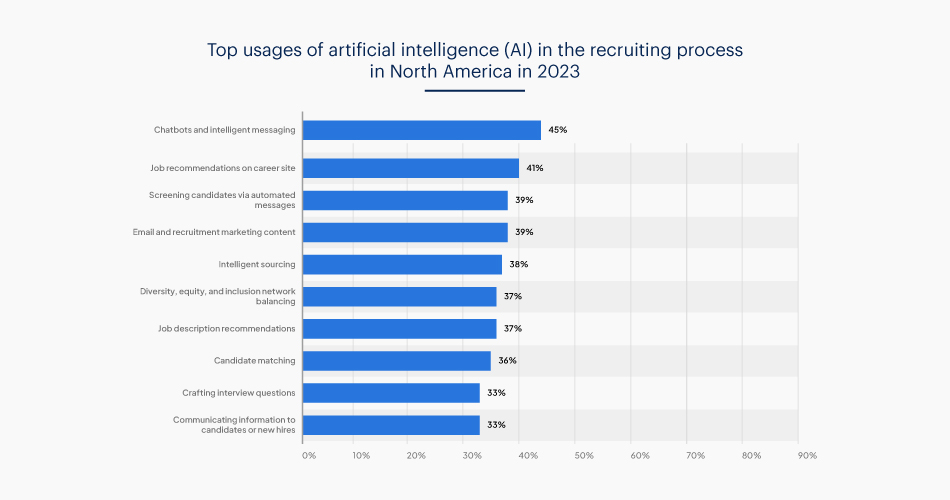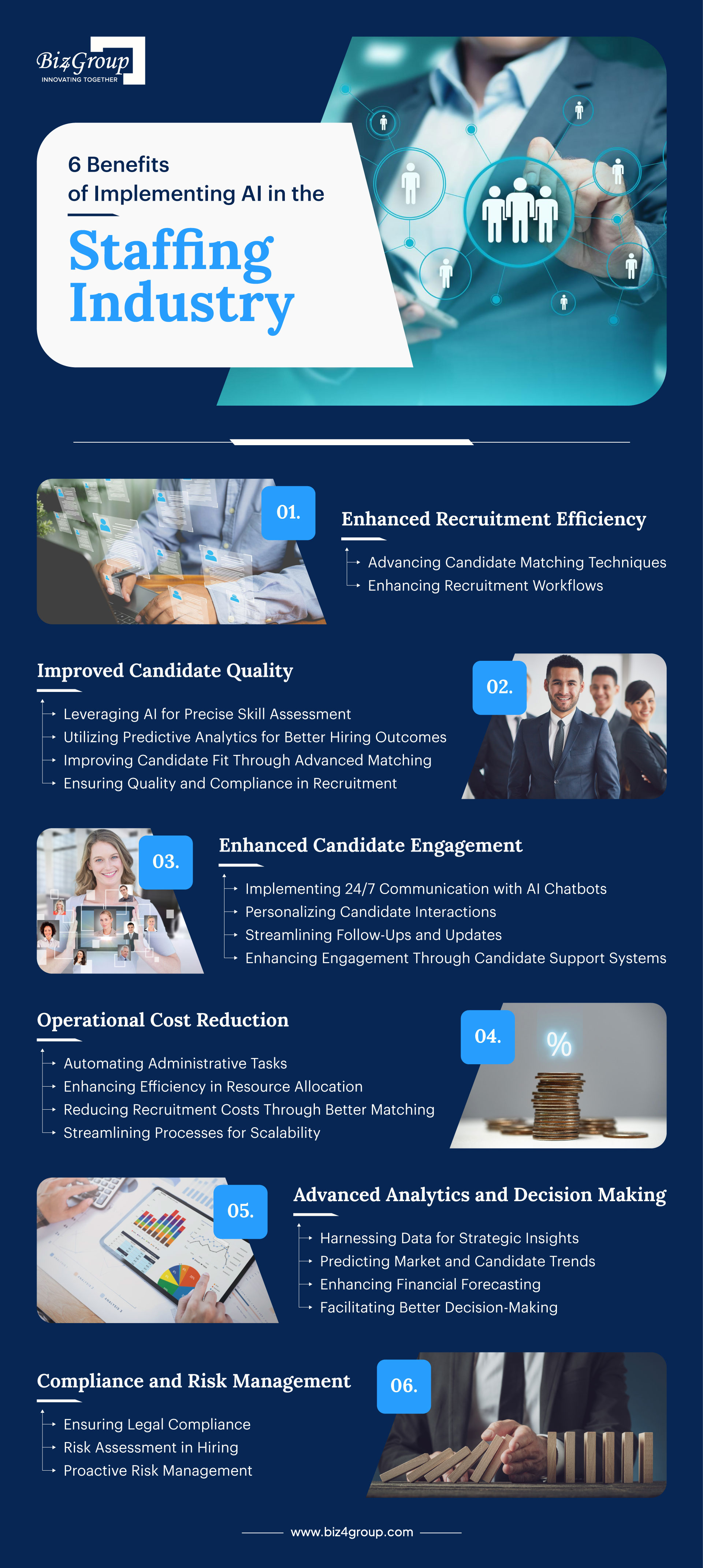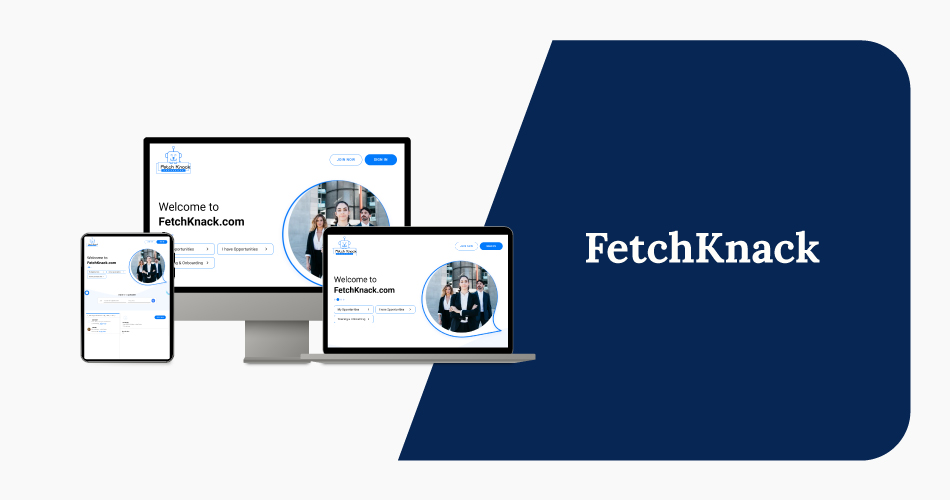Basic AI Chatbot Pricing: A simple chatbot that can answer questions about a product or service might cost around $10,000 to develop.
Read More
AI is advancing in various proportions across industries and one such is the staffing industry. Such an industry is distinguished from the other ones by its specific problems: the applicants' matching to the job position, handling many jobs, and maintaining communication with the candidates.
According to Statista, in North America in 2023, the top used case with 41 percent of response with job recommendations on career sites as their topmost AI usage.

Source ”Statista”
AI staffing solutions enhance the eventual result and increase the job execution quality of staffing processes. This article will highlight the most important advantages of automating human resources activities, providing clear evidence of how technology can revolutionize the whole industry.
Staffing with AI optimizes the staffing industry task performance, accurate job matching, as well as simplifying and enhancing the decision-making process. The introduction concentrates on the 6 revolutionary advantages which are achieved when AI is implemented as a staffing practice and how it influences workforce management.

Enhanced recruitment efficiency is where AI is considered an instrument for streamlining operations. This includes candidate sourcing at a faster pace and quick communication of automated kinds. As a result, the recruiters can devote their time to strategic things to enhance the overall efficacy of the recruitment.
The usage of AI algorithms in staffing industry enables the access to detailed information about potential candidates such as crucial skills like hard skills and soft skills, culture fit, and professional development. This method not only makes it easier for employers to recruit but also helps in faster placements and provides the right career for candidates.
AI enables the matching of candidates by analyzing the huge amount of data from job descriptions and candidate profiles, using algorithms to assess compatibility across different dimensions such as skills, experience, and cultural fit. This tailored matching significantly improves the chances of candidates to be placed in positions where they can excel and perform effectively and actively.
AI in staffing industry not only automates candidate identification and communication, but also helps manage schedules and databases. This automation dramatically heightens efficiency unleashing recruiters to focus more on strategic engagements and decision-making which further uplifts recruitment operations productivity.
Also Read: AI in Remote Staffing: Trends and Outlook for 2024
AI makes the best use of your data for a better match of skills and predictive analytics. The advanced AI tools automate skill verification and predict long-term job performance. These tools help to ensure that only the most suitable candidates are going to be selected through the hiring process.
AI in staffing industry does automatic testing and advanced simulation, to provide more accurate candidate skills. These assessment procedures produce objective information on the capability of a prospective employee. This is quite crucial because only the best candidates with the required skill set will be further selected to fit the job. Through this technology, the selection process is narrowed down and helps identify potential training opportunities, lifting their work in professional development.
Through the behavioral analysis of past hiring successes followed by employee longevity, AI can find those patterns and predict future outcomes with unprecedented accuracy. This ability endows staffing companies with more authority in decision-making, decreasing greatly the risk of employees resigning and improving the overall quality of hiring.
Beyond the fact-fit for work and others, AI also estimates personality traits and cultural fit which are prerequisites for long-term job attachment. AI helps staffing agencies squeeze candidates into conditions where they are going to prove to be more effective. That improves job satisfaction and productivity.
AI in HR ensures that the recruiting process is consistent with industry standards and regulations, which is one of the aspects of high-quality recruitment practices. Automated compliance checks work against biases and building trust through such practices as ensuring fair hiring procedures is essential both for candidates and clients that the firm is dealing with.
Staffing agencies thus have the potential to significantly raise the quality of their candidate placement, bringing about more productive and lasting employment relations when combined with AI’s advanced capabilities. This not only enriches the agency's image and helps in increasing the client and candidate satisfaction levels.

AI gadgets are used to achieve higher levels of connection with applications, portals, chat bots, or any personalized communication channel 24/7. This chapter demonstrates that AI-powered chatbots and customized progression strategies increase the candidate’s experience and build connections which are crucial.
AI in staffing industry helps with candidate engagement through message bots that can give out responses instantly 24/7. In this regard, they can navigate all application procedures and details of a particular position, fourth in the necessary details of a job in question within the given time.
AI in staffing industry can be used to personalize the communication process for job seekers. Through candidate information analysis, AI tools can send messages and updates relevant to each target. This form of communication at this level helps to build a stronger relationship between the candidate and the staffing firm, which further improves the overall candidate experience.
Chatbot development services emplace AI solutions to streamline that candidates receive routine e-mail notifications about updates and follow-ups. Either through a hint on the upcoming interview or feedback on an already conducted interview, candidates will be kept up to date thanks to AI. This not only helps in the betterment of the communication process but also demonstrates to the candidates that they are treasured, which is very critical to their engagement and satisfaction.
AI is very capable of creating job support systems like career advice automation, for job applicants or interview preparation tools. They provide candidates with the necessary tools to better land a job and on the other hand, they position their company based on the candidate's career advancement. Through such interactional motivational involvement, a higher keep of candidate engagement and referral can be achieved.
These AI-introduced alterations in career engagement have great importance in establishing relationships with job seekers along with the long-term cycle. It is important that candidates are not only well-informed about the merits of participating in elections but that they also receive continuous coaching throughout the process to determine the best way forward.
Also Read: 5 Exclusive Benefits of AI in Project Management in 2024
See how AI decreases the operational costs of staffing by automating the administrative work and reorganizing the resources. In this section, it investigates AI role in helping to cut down on the manual work in hiring processes and gain great cost savings while improving the operational processes.
AI in staffing industry drastically reduces operational costs by automating administrative tasks that are typically time-consuming and prone to human error. This includes tasks like sorting applications, scheduling interviews, and updating candidate records. By automating these processes, staffing firms can allocate their human resources to more strategic activities, such as client management and business development, which are essential for growth.
AI in staffing industry plays a vital role in optimizing resource allocation. By analyzing trends and forecasting staffing needs, AI enables firms to plan their workforce more efficiently. This foresight helps avoid overstaffing or understaffing situations, which can be costly. Furthermore, AI can identify the most cost-effective strategies for talent acquisition and management, ensuring that resources are utilized in the most economical way possible.
AI improves the accuracy of candidate-job matching, which directly impacts recruitment costs. Better matching means fewer resources are spent on interviewing unsuitable candidates and onboarding employees who may not stay long-term. By reducing turnover and increasing placement success rates, AI helps staffing firms save on both direct hiring costs and the indirect costs associated with high turnover rates.
AI not only cuts current operational costs but also prepares staffing firms for scalable growth. Automated systems and processes mean that firms can handle an increase in workload without a corresponding increase in staffing levels. This scalability is crucial for firms looking to expand their operations without incurring significant additional costs.

AI uses advanced analytics and decision making in the staffing industry. This section will demonstrate how AI analytics tools analyze huge data sets to provide useful information, forecast trends and support strategic decision-making that is in line with the business objectives.
Comprehensive staffing solutions enabled by AI uses analytics tools to learn from vast amounts of data & digitally transform them into actionable data, which in turn allows staffing firms to refer to this information by making data-driven decisions. Such tools of candidate data, recruitment processes as well as market trends empower employers with a more inclusive outlook to provide integrated estimates of the operational efficacy and improvement opportunities. Through that, staffing companies can effectively implement those findings into their process all the while achieving the optimal balance of services compared to existing market needs.
Advanced analytics enable staffing companies therefore to be ahead of the game and understand both the market trends and the candidate reactions. AI systems can define which skills are competitive today, assess which careers change over time, and predict which candidates could be available in the future. Such forecasting will allow companies to be proactive in their hiring strategies and accomplish that before competitors in the sector get there and fill up market demands.
AI development services are precious for financial planning since it predicts a trend that adapts to up-to-date information and historical data. The workers' scheduling forecasts secure the seamless budget managing process, discarding resources randomly, and creating a platform for business growth. Modeling revenue fluctuations and financial results by AI is vital to holding the balance sheet steady and supporting the ongoing growth of the business.
AI these days not only uncover the bottlenecks in company operations and market but also improve strategic level decision making. Leaders of staffing firms can utilize AI-generated reports and dashboards for assessing their business performance, identifying critical factors of success, and making smart choices that lead the firm toward long-run results. That deliberative decision-making process is indeed fundamental to remaining on top and achieving sustainability of the business.
Also Read: An Overview of Insurance Chatbot Development: Features, Benefits, and Cost
AI significantly bolsters compliance and risk management in the staffing industry by offering tools and solutions that streamline and safeguard recruitment processes. Here are the key elements to provide the more information on compliance and risk management.
The importance of artificial intelligence in HR is vital as it makes staffing firms very capable of dealing with continuously evolving compliances. By implementing AI-enabled systems, these systems can be updated with the newest labor laws and regulatory guidelines at any time, all of which are then immediately applied to the processes concerned.
This is the aspect that includes activities such as candidates' screening, payroll, and employment contracts. The system of automatic financial control decreases human error incidence and prevents firms from breaking the law, avoiding costly fines and legal punishments.
AI also has an essential position in identifying the risks of hiring managers for different decisions. AI tools do that by using historical data and predictive analytics to forecast candidates' chances of getting roles in certain positions. This includes the assessment of the suitability of the candidate for long-term success in the position and his effect on the harmony of the employees.
Therefore, these tests substantially help the staffing firms to make better decisions and mostly avoid the high rates of turnover and instability of employment provided.
AI facilitates staffing agencies in forecasting risk management by using information like hiring process best practices and liabilities. AI can, for example, detect patterns that would suggest the existence of bias or inefficiency problems in the system and help companies rectify these glitches. This forward-thinking approach adds cost efficiency to operations and improves the entire recruitment into a system that is equitable and effectively managed.
AI enables greater compliance and risk management and thus allows staffing firms to work more efficiently in full compliance with the law. This establishes greater credibility and trust both with clients and candidates, which helps the company to get a good name of concern for society in this sector.

FetchKnack, developed by Biz4Group, is an AI-driven staffing platform which is a step towards the change in the staffing sector. This state-of-the-art tool is designed to exploit the power of machines learning in drumming down unnecessary processes in the hiring process, hence boosting efficiency and precision in the process.
The search platform leverages AI-enabled fit-based candidate matching powered by advanced algorithms that assess each job description with each candidate curriculum vitae. With this, employers get to identify the best fit candidates out of a lot of options, based on their skills, attitudes about culture, and career progression. Consequently, recruitment is made simpler and placement efficiency is increased.
Additionally, FetchKnack has automated sorting and resume screening process. Through AI, which has the capability of speedily cracking through huge volumes of applications, it finds those job seekers who have unique qualities. Therefore, this automation acted as a support function to human recruiters in terms of how it minimizes the burden of recruiters so that they can work on more crucial tasks.
FetchKnack apart from predictive analytics, is also another advantage of forecasting hiring success ability by using it. This feature scrutinizes past data as well as current hiring trends, such that it can predict future outcomes, improving the efficiency of making decisions and, therefore, reducing vetting errors. Using AI-enabled functionalities, FetchKnack becomes a central element of any agency that seeks to be at the forefront of technology era in terms of competition.

The inclusion of generative ai development company in HR and recruitment departments is deriving a new source of capacity on top of efficiency and effectiveness, thus setting a new pace in operations.
AI in staffing industry can be used to automate common tasks and improve employee interactions, leading to the reduction of costs, improving the placement metric, and enhancing overall engagement.
AI evolves at the rate at which it provides an organization with the best approach in aligning with the tempo of the job market and keeping the company relevant in the industry. Crystalizing AI into the organizational culture opens the door to staffing companies sustaining, changing, and executing their strategies more effectively in a vibrant business climate.
AI in staffing industry streamlines various tasks such as resume screening, candidate matching, and communication, reducing time and effort traditionally required for these processes. Additionally, AI-driven analytics provide insights for optimizing recruitment strategies and resource allocation.
AI enables faster and more accurate screening of candidate applications by analyzing resumes and extracting relevant information like skills and experience. Moreover, AI algorithms can match candidates to job roles based on factors such as hard skills, soft skills, cultural fit, and career progression, leading to better placements and improved efficiency.
AI conducts precise skill assessments through automated testing and simulation, providing objective insights into a candidate's capabilities. Predictive analytics analyze past hiring trends and employee longevity to predict future hiring success, ensuring the selection of candidates with the right skill set and fit for the job.
with Biz4Group today!
Our website require some cookies to function properly. Read our privacy policy to know more.